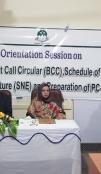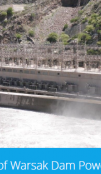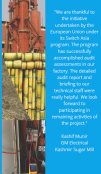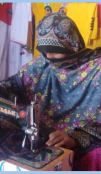International Labour and Environmental Standards Application in Pakistan’s SMEs (ILES)
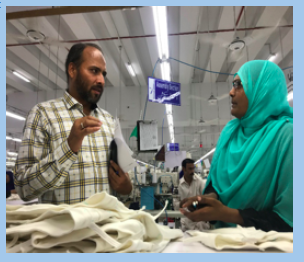
Duration: October 2016 - September 2022
Budget: €11.6 million (EU Contribution €11mn)
Location: Across Pakistan
Implementing Partners: International Labour Organisation (ILO) World Wide Fund for Nature (WWF)
The ILES project works with Pakistan’s federal and provincial governments, workers’ and employers’ representatives and private sector businesses to improve implementation of international labour and environmental standards in Pakistan. It also supports Pakistan’s privileged access to the market of the European Union (so-called GSP+ status) and its competitiveness in the international market. The project focuses on the textile, ready-made garment and leather industries, which are the largest parts of Pakistan’s exports.
The challenge
Pakistan has ratified the ILO’s core conventions, which cover child and forced labour, discrimination, freedom of association and collective bargaining, as well as a number of environmental agreements. The Government of Pakistan now needs to review relevant laws, policies and comply with international standards in order to deliver on these international commitments. Pakistan has a large textile, garment and leather industry, but working conditions and use of resources need to be improved and pollution reduced.
How do we address the challenge?
ILES provides support to the federal and provincial governments, workers’ and employers’ representatives to improve laws and policies. ILES also produces research about labour standards and environmental standards, to provide a better understanding of some of the problems and identify solutions. ILES also works directly with businesses to improve labour and environmental standards.
ILES works with small factories to improve occupational safety and health and larger factories to improve efficiency, quality and relationships between workers and management. ILES will also work with industries that supply to Europe to make them more productive and better places to work. WWF provides trainings on Smart Environmental Management Practices, a customised training programme to help enterprises use fewer resources and produce less pollution.
Support to policy
The EU is one of Pakistan’s main trading partners, accounting for the largest share of Pakistan’s global exports. Since January 2014, Pakistan has benefited from GSP+, an agreement which allows Pakistan to export to the EU without paying import taxes, on condition that it meets international labour and environmental standards. Textiles and clothing products make up 80% of these exports. Pakistan’s trade to the EU has increased by almost 65% since 2014.
What can we learn from this project?
The EU wants to ensure that Pakistan meets it obligations and the project aims to help Pakistan do better. Working with government, workers’ and employers’ organisations we can focus on areas of concern. The ILO is looking closely at safety concerns, as well as how problems and disputes at work are resolved and how trade unions can be supported. We also work with brands and retailers who buy goods from Pakistan to involve them in making businesses more responsible. WWF works closely with government and the wider community to identify solutions to environmental challenges. They also work directly with individual factories to help them use less water, electricity and chemicals, to recycle energy and to lower their environmental impacts. We also try to coordinate with other projects working in Pakistan, to make sure that development funds are used effectively.
EU in Pakistan
The European Union (EU) funds projects and programmes around the world in order to help addressing global and local challenges. The reduction of poverty and the respect of fundamental rights and freedoms are key objectives in this context.
In Pakistan, the EU is committed to a stable, democratic and pluralistic country that respects human rights and benefits from its full economic potential by supporting sustainable and inclusive development for all its citizens. The EU provides Pakistan with about €100 million annually in grants for development and cooperation. Among other issues, the EU supports Pakistan in its efforts to tackle poverty, increase education, promote good governance, human rights, rule of law and ensure sustainable management of natural resources. EU-funded projects are covering all of Pakistan with a special focus on Sindh and Balochistan.
The collaboration between the European Union and Pakistan is grounded in the Strategic Engagement Plan (SEP) signed in 2019. Areas of cooperation under the SEP include peace and security, democracy, rule of law, human rights, and migration but also sectors such as energy, climate change and science and technology.
The EU is one of Pakistan’s largest trading partners. The EU supports Pakistan’s integration into the world economy and its sustainable economic development, namely by granting it preferential access to the European single market under the GSP+ system since 2014. Under this scheme almost 80% of Pakistan’s exports enter the EU duty and quota free. In 2018, Pakistani exports to the EU were worth €6.9 billion.
In order to enjoy the trade preferences under GSP+, Pakistan needs to demonstrate progress on the implementation of 27 international conventions on human rights, good governance, labour rights and environmental protection.
Delegation of the European Union to Pakistan,
House 9, Street 88, G-6/3, Islamabad
Phone: +92 51 227 1828, Fax: +92 51 282 2604
Email: Delegation-Pakistan@eeas.europa.eu
To report any irregularities contact us on DELEGATION-PAKISTAN-IRREGULARITIES@eeas.europa.eu

